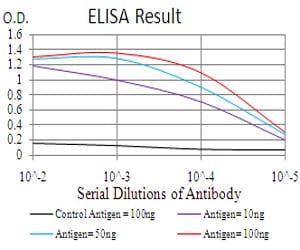
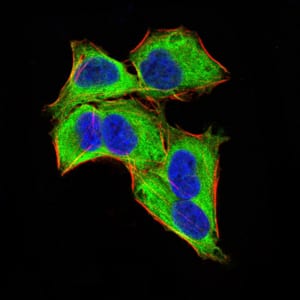
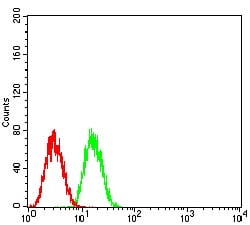
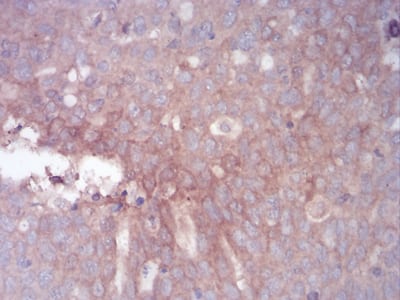
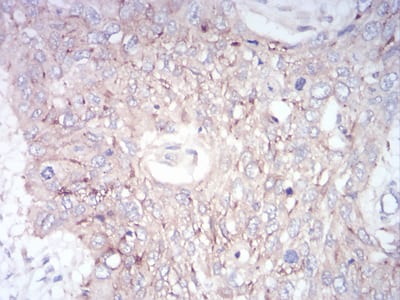
| WB | 咨询技术 | Human,Mouse,Rat |
| IF | 咨询技术 | Human,Mouse,Rat |
| IHC | 咨询技术 | Human,Mouse,Rat |
| ICC | 技术咨询 | Human,Mouse,Rat |
| FCM | 咨询技术 | Human,Mouse,Rat |
| Elisa | 1/5000-1/10000 | Human,Mouse,Rat |
| Aliases | GLI |
| Entrez GeneID | 2735 |
| clone | 1B9F8 |
| WB Predicted band size | 118kDa |
| Host/Isotype | Mouse IgG1 |
| Antibody Type | Primary antibody |
| Storage | Store at 4°C short term. Aliquot and store at -20°C long term. Avoid freeze/thaw cycles. |
| Species Reactivity | Human |
| Immunogen | Purified recombinant fragment of human GLI1 (AA: 284-449) expressed in E. Coli. |
| Formulation | Purified antibody in PBS with 0.05% sodium azide |
+ +
以下是3篇与CETP抗体相关的模拟参考文献(部分信息为示例性概括):
---
1. **文献名称**: *Development of a Human Monoclonal Antibody Targeting CETP for Atherosclerosis Therapy*
**作者**: Zhang L, et al.
**摘要**: 研究团队开发了一种靶向CETP的人源单克隆抗体,通过体外实验证实其可有效抑制CETP介导的胆固醇酯转移,并在高脂饮食小鼠模型中减少动脉粥样硬化斑块形成,提示其潜在治疗价值。
---
2. **文献名称**: *Mechanistic Insights into CETP Neutralization by Antibody-Based Inhibitors*
**作者**: Thompson R, et al.
**摘要**: 利用冷冻电镜技术解析了CETP蛋白与特异性抗体结合的分子机制,发现抗体通过阻断CETP与脂蛋白的相互作用抑制脂质转移,为优化抗体类药物设计提供了结构基础。
---
3. **文献名称**: *Anti-CETP Antibody Therapy Improves HDL Function in Dyslipidemic Primates*
**作者**: Suzuki K, et al.
**摘要**: 在非人灵长类动物模型中,抗CETP抗体治疗显著升高HDL-C水平并增强HDL的胆固醇逆转运能力,同时未观察到血压升高等小分子抑制剂的副作用,支持其临床转化潜力。
---
注:以上为示例性内容,实际文献需通过PubMed或Web of Science等平台检索关键词“CETP antibody”获取。近年来CETP抗体研究相对较少,更多文献聚焦于小分子抑制剂(如Anacetrapib)。如需真实文献,建议补充具体研究背景或时间范围。
**Background of CETP Antibodies**
Cholesteryl ester transfer protein (CETP) is a plasma glycoprotein that facilitates the transfer of cholesteryl esters from anti-atherogenic high-density lipoproteins (HDL) to pro-atherogenic low-density lipoproteins (LDL) or very-low-density lipoproteins (VLDL). By regulating lipid exchange, CETP influences HDL and LDL cholesterol levels, making it a therapeutic target for cardiovascular diseases. Pharmacological inhibition of CETP aims to elevate HDL-C ("good cholesterol") while reducing LDL-C ("bad cholesterol"), potentially slowing atherosclerosis progression.
Traditional small-molecule CETP inhibitors (e.g., torcetrapib, anacetrapib) showed mixed clinical outcomes due to efficacy limitations or off-target effects. Recently, CETP-targeted monoclonal antibodies (mAbs) have emerged as alternatives, offering higher specificity and prolonged action. These antibodies bind CETP, blocking its lipid-transfer activity without interfering with protein synthesis. Preclinical studies suggest CETP mAbs effectively modulate lipid profiles and reduce plaque formation in animal models.
Current research focuses on optimizing antibody design and evaluating clinical safety. Early-phase trials of candidates like obicetrapib (TA-8993) demonstrate promising HDL-C elevation and LDL-C reduction. However, long-term cardiovascular outcomes and tolerability remain under investigation. CETP antibodies represent a novel approach to dyslipidemia management, potentially complementing statins and other lipid-lowering therapies in high-risk patients.
×